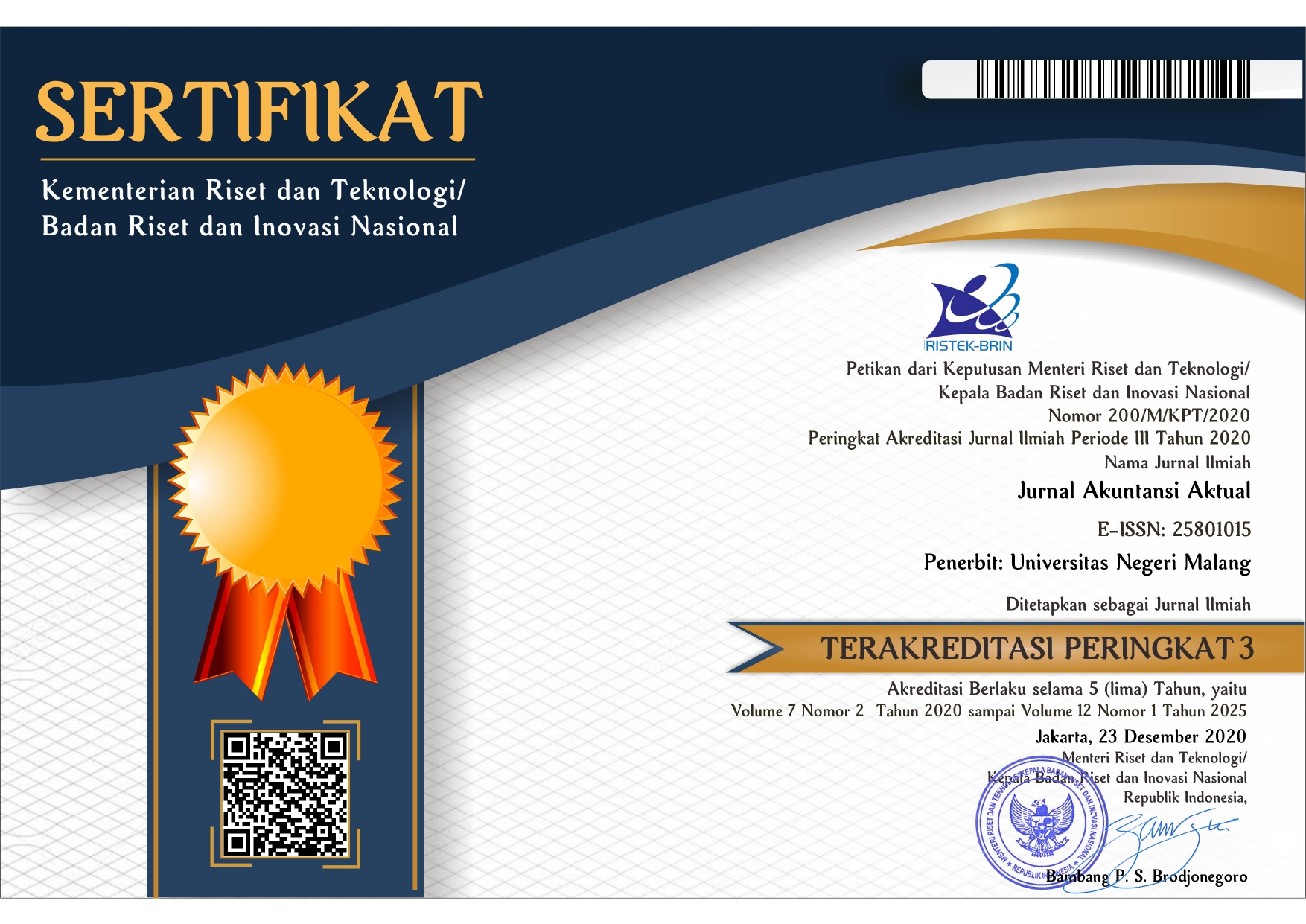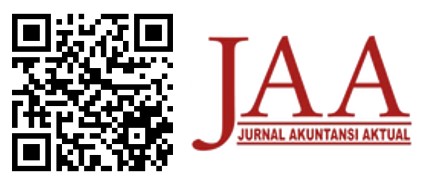Motivasi untuk berbagi pengetahuan ke konsultan pajak
Abstract
Keywords
Full Text:
PDFReferences
Argote, L., & Ingram, P. (2000). Knowledge transfer: A basis for competitive advantage in firms. Organizational Behavior and Human Decision Processes, 82(1), 150-169.
Azwar, S. (2001). Reliabilitas dan validitas SPSS. Pustaka Pelajar. Yogyakarta.
Bandura, A. (1986). The explanatory and predictive scope of self-efficacy theory. Journal of social and clinical psychology, 4(3), 359-373.
Bandura, A. (1989). Human agency in social cognitive theory. American psychologist, 44(9), 1175.
Bandura, A., & Walters, R. H. (1977). Social learning theory (Vol. 1): Prentice-hall Englewood Cliffs, NJ.
Blomkvist, M., Johansson, J., & Malmström, M. (2016). Accounting Knowledge in Innovative Firms: Direct Contacts with External Auditors for Strategic Actions. International Journal of Managerial and Financial Accounting, 8(3/4), 209-228.
Bonner, S. E. (1990). Experience effects in auditing: The role of task-specific knowledge. Accounting Review, 72-92.
Borgatti, S. P., & Cross, R. (2003). A relational view of information seeking and learning in social networks. Management science, 49(4), 432-445.
Brown, V. L., Gissel, J. L., & Neely, D. G. (2016). Audit quality indicators: perceptions of junior-level auditors. Managerial Auditing Journal.
Calantone, R. J., Kim, D., Schmidt, J. B., & Cavusgil, S. T. (2006). The influence of internal and external firm factors on international product adaptation strategy and export performance: A three-country comparison. Journal of Business Research, 59(2), 176-185.
Chesbrough, H. (2012). Open innovation: Where we've been and where we're going. Research-Technology Management, 55(4), 20-27.
Chiang, Y. H., & Hung, K. P. (2010). Exploring open search strategies and perceived innovation performance from the perspective of inter‐organizational knowledge flows. R&d Management, 40(3), 292-299.
Chiu, C.-M., Hsu, M.-H., & Wang, E. T. (2006). Understanding knowledge sharing in virtual communities: An integration of social capital and social cognitive theories. Decision support systems, 42(3), 1872-1888.
Choi, S. Y., Lee, H., & Yoo, Y. (2010). The impact of information technology and transactive memory systems on knowledge sharing, application, and team performance: A field study. MIS quarterly, 855-870.
Davenport, T. H., & Prusak, L. (1998). Working knowledge: How organizations manage what they know: Harvard Business Press.
Dewi, A. A. I. P., Sudarma, M., & Baridwan, Z. (2019). Mengupas Bentuk Dilema Dari Sisi Konsultan Pajak. Jurnal Ilmiah Akuntansi dan Bisnis, 132-141.
Frecknall-Hughes, J., & Kirchler, E. (2015). Towards a general theory of tax practice. Social & Legal Studies, 24(2), 289-312.
Glaister, K. W., & Hughes, J. F. (2008). Corporate strategy formulation and taxation: evidence from UK firms. British Journal of Management, 19(1), 33-48.
Glückler, J., & Armbrüster, T. (2003). Bridging uncertainty in management consulting: The mechanisms of trust and networked reputation. Organization studies, 24(2), 269-297.
Grönlund, J., Sjödin, D. R., & Frishammar, J. (2010). Open innovation and the stage-gate process: A revised model for new product development. California management review, 52(3), 106-131.
Hau, Y. S., Kim, B., Lee, H., & Kim, Y.-G. (2013). The effects of individual motivations and social capital on employees’ tacit and explicit knowledge sharing intentions. International Journal of Information Management, 33(2), 356-366.
Hayes, S., Freudenberg, B., & Delaney, D. (2018). Role of Tax Knowledge and Skills: What Are the Graduate Skills Required by Small to Medium Accounting Firms. J. Australasian Tax Tchrs. Ass'n, 13, 152.
Herawaty, A., & Susanto, Y. K. (2008). Profesionalisme, pengetahuan akuntan publik dalam mendeteksi kekeliruan, etika profesi dan pertimbangan tingkat materialitas. Paper presented at the 2nd National Conference UKWMS, Mei.
Huysman, M., & de Wit, D. (2003). A critical evaluation of knowledge management practices. Sharing expertise: Beyond knowledge management, 27-55.
Islam, Z. M. (2010). The mediating effects of socialization on organizational contexts and knowledge sharing. Journal of Knowledge globalization, 3(1), 31-48.
Ko, D. G. (2010). Consultant competence trust doesn't pay off, but benevolent trust does! Managing knowledge with care. Journal of Knowledge Management.
Kombih, M. T., & Suhardianto, N. (2018). Pengaruh Aktivitas Pemasaran, Kinerja Keuangan, Dan Aset tidak Berwujud Terhadap Nilai Perusahaan. EKUITAS (Jurnal Ekonomi dan Keuangan), 1(3), 281-302.
Krackhardt, D. (1992). The Strength of Strong ties: the importance of philos in networks and organization in Book of Nitin Nohria and Robert G. Networks and Organizations. Cambridge, Harvard Business School Press, Hershey, USA.
Lee, J.-N. (2001). The impact of knowledge sharing, organizational capability and partnership quality on IS outsourcing success. Information & management, 38(5), 323-335.
Liebowitz, J. (2001). Knowledge management and its link to artificial intelligence. Expert systems with applications, 20(1), 1-6.
Lumbantobing, P. (2011). Manajemen knowledge sharing berbasis komunitas. Bandung: Knowledge Management Society Indonesia.
Mulligan, E., & Oats, L. (2016). Tax professionals at work in Silicon Valley. Accounting, Organizations and Society, 52, 63-76.
Orr, J. E. (2016). Talking about machines: An ethnography of a modern job: Cornell University Press.
Pratomo, S. A. (2017). Manajemen Aset Kekayaan Intelektual. Kiat Bisnis, 6(5).
Putra, Y. R. A. N., Indrabudiman, A., Riyadi, S., & Handayani, W. S. (2020). Pengaruh karakteristik perusahaan terhadap tax avoidance serta dampaknya pada nilai perusahaan. Jurnal Akuntansi Aktual, 7(1), 57-66.
Sila, M., Bambang, S., Zaki, B., & Aulia Fuad, R. (2016). The Effect of Knowledge and Experience on Professional Auditor’s Judgment: Study on State Auditor in Indonesia. International Journal of Management and Administrative Sciences (IJMAS), 3(10), 98-106.
Sugiyono, D. (2006). Statistika untuk penelitian. Bandung: CV. Alfabeta.
Suharyat, Y. (2009). Hubungan antara sikap, minat dan perilaku manusia. Jurnal Region, 1(3), 1-19.
Tarsidi, D. (2010). Teori Kognitif Sosial Albert Bandura. Universitas Pendidikan Indonesia. Bandung.
Van den Hooff, B., & Huysman, M. (2009). Managing knowledge sharing: Emergent and engineering approaches. Information & management, 46(1), 1-8.
Van der Rijt, P., Hasseldine, J., & Holland, K. (2019). Sharing corporate tax knowledge with external advisers. Accounting and Business Research, 49(4), 454-473.
Wang, C.-C., & Yang, Y.-J. (2007). Personality and intention to share knowledge: An empirical study of scientists in an R&D laboratory. Social Behavior and Personality: an international journal, 35(10), 1427-1436.
Wang, S., & Noe, R. A. (2010). Knowledge sharing: A review and directions for future research. Human resource management review, 20(2), 115-131.
DOI: http://dx.doi.org/10.17977/um004v7i22020p145
Refbacks
- There are currently no refbacks.

This work is licensed under a Creative Commons Attribution-ShareAlike 4.0 International License.
Jurnal Akuntansi Aktual is indexed by:















